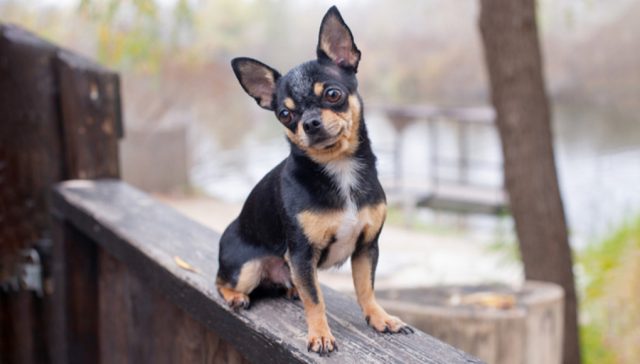
Table of Contents
- The History of the Chihuahua
- Breed Standard & Popularity
- Main Attributes of a Chihuahua
- The Temperament & Personality of a Chihuahua
- Chihuahua for Families
- Living Requirements for Chihuahuas
- How to Take Care of a Long Haired Chihuahua
- Health & Common Ailments of a Chihuahua
- Chihuahua versus Teacup Chihuahua
- Frequently Asked Questions about Chihuahuas
- Should You Get a Chihuahua
Don’t you find chihuahuas in purses so adorable?
The Chihuahua is considered the smallest dog breed in the world. It’s no wonder people would love to bring these pups in their handbags wherever they go!
But there’s more to this tiny breed than meets the eyes. For instance, chihuahuas are feisty furballs that are so full of energy and curiosity!
This breed profile will be your ultimate comprehensive guide for understanding all there is to know about chihuahuas!
There is a lot of personalities piled up into this tiny body! Chihuahuas are fun and playful to be around, yet they can also be well-tempered enough to cuddle or stroll them around at the mall.
Chihuahuas are very brave and wouldn’t hesitate to explore despite their small size. Even a teacup chihuahua has a strong heart and wouldn’t mind facing other larger dogs!
If you worry about having a dog that can take up too much space, you’ll have less of that concern when you have a chihuahua!
They are so tiny that having a small dog bed or even your couch would be enough for this pup! It’s almost the same living conditions when you have a long-haired chihuahua too!
The Chihuahua can quickly form a solid connection to a single person, and they can be the most loving pup you’ll ever have!
It’s no wonder Elle Woods was so fond of her Chihuahua that she got into extreme measures to defend her pooch!
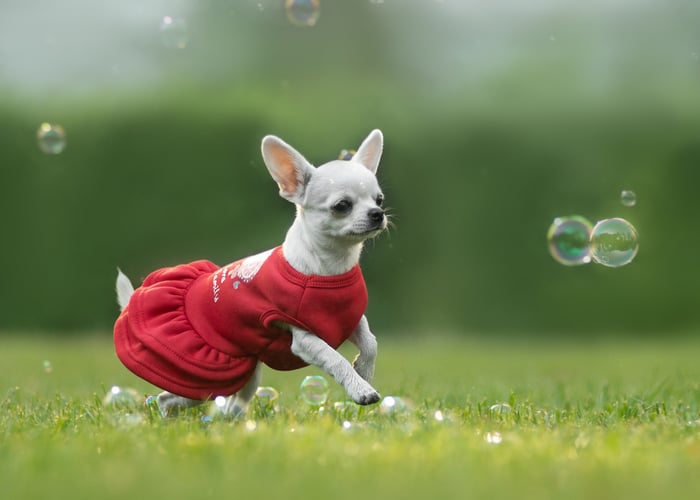
The History of the Chihuahua
The origin of the Chihuahuas started thousands of years ago, around the 9th century. There were Toltec carvings that resembled the Chihuahua, having the same erect ears and round heads.
They said that they are a descendant of Central and South American dogs called Techichi. It’s a larger version of today’s Chihuahua and was prominent in the Toltec civilizations.
When the Aztecs conquered the Toltecs, they treated the Techichi as mystical creatures that could heal the sick, predict the future, and guide souls in the underworld.
They lived in temples and were involved in Aztec rituals. Some Techichi were killed to bury them along with the dead.
The Spanish conquered the Aztecs in the late 1500s, and the Techichi became unimportant and almost extinct.
There were other theories about the origin of Chihuahuas. They were said to be from China and later brought to Mexico by Spanish traders, which they bred with small native dogs.
While the true origin of this dog breed remains uncertain, the Chihuahua we know today were discovered by Americans in the State of Chihuahua, Mexico.
They were discovered in the 1850s, wherein they were named after the state they were found. Chihuahuas were first seen in dog shows in 1890.
Breed Standard & Popularity
In 1904, the breed was recognized in the American Kennel Club with a Chihuahua named “Midget” as the first to be registered. After a few years, “Beppie” was the first champion of its breed.
Chihuahuas have naturally short hair. The long-haired Chihuahua is a modified breed that might be a cross of Pomeranians or Papillons.
As they are affectionately called, the Chis gained popularity during the 1930s to 1950s when a famous musician and Latin bandleader Xavier Cugat always seemed to have this dog in his performances.
Since then, the Chihuahua has become one of the most popular breeds. According to the American Kennel Club Breed Popularity Ranking, this pooch ranks 34th on the list!
Main Attributes of a Chihuahua
There are many things to consider when you are getting a Chihuahua. They have two primary varieties based on their coat type: short and long-haired Chihuahua.
Their hair length and coat type can be deciding factors for adoption for some dog owners. Others love them for their petite bodies.
If you are the type of owner who has a weakness for small dogs, you can also have the teacup Chihuahua. They are just like the average Chis but tinier and more fragile.
To give you a general overview of the Chihuahuas, here are their main characteristics:
Appearance & Size
Considered the world’s smallest breed, chihuahuas have an average size ranging from 5 to 8 inches, weighing only 6 pounds or less.
The teacup Chihuahua weighs less, never exceeding 5 pounds. They don’t have a specific size or height, but most breeders consider any litter smaller than the average is already a teacup!
This dog breed comes in various colors and coat types. While most people see chihuahuas as having smooth hair with solid color, it varies in length and markings.
They have erect ears that can often have fringed hair, especially for the long-haired Chihuahua.
Known to have full, luminous eyes that seem to pop out of their tiny heads, you better not fall for their perfect ‘puppy dog’ eyes!
The structure of their head also varies — they can either have a round “apple” head or a deer-shaped one that is narrower with a longer snout.
Coat Type & Markings
Chihuahuas have two distinct coat types: smooth and long. The soft coat is very short and sticks quite to their skin.
The long-haired Chihuahua has soft and slightly wavy hair. They have fringed ears, and their tails are long and complete as a plume.
You will see a large ruff on the neck, longer on the hind legs and stomach, and fur feathering on their legs for the long-haired Chihuahua.
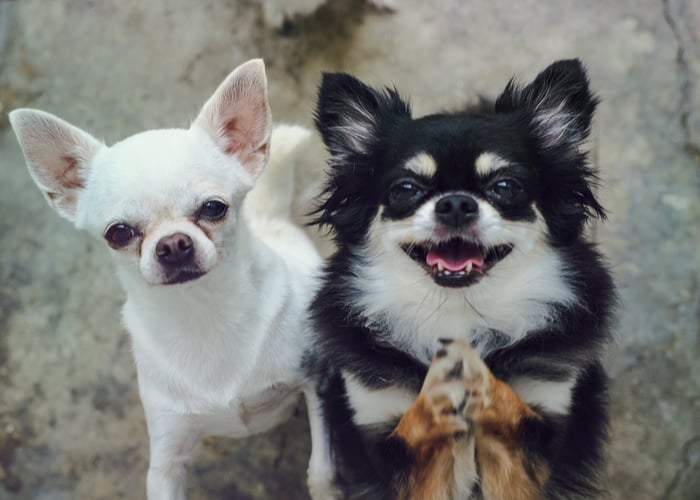
According to the breed standard, over 30 listed colors, including black, black & tan, cream, red, and chocolate.
There are 11 registered markings as stated by the AKC. The most common patterns are solid, marked, and splashed.
All varieties of the Chihuahua have versatile coats that can be easily groomed and styled. Some dog owners would even enjoy dressing up their pup.
Because of this and their handbag size, they would make great canine partners for fashion icons and famous personalities like Paris Hilton.
The Temperament & Personality of a Chihuahua
Big things come in small packages. This statement couldn’t be any more true for Chihuahuas!
These “purse dogs” are charming, loyal, clever, and curious. They have a bold attitude but can also be mellow enough to cuddle with.
Chihuahuas are lap dogs, and there’s no such thing as too much time snuggling. They might even bark a lot so that they could go with you when you’re going out.
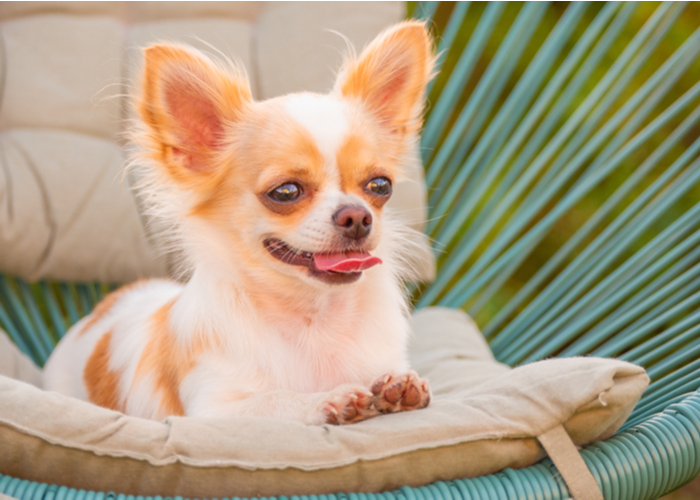
They are very tiny, so you should always be extra careful whenever they follow you around. You wouldn’t want to end up stepping on them!
Due to their tiny bodies, they can’t withstand walking around for too long. Chihuahuas are more than happy if you carry them around most of the time.
Still, this pup would need some exercise! Having to play fetch or retrieve toys indoors for about 20 minutes can be enough for a Chihuahua.
They can be very demanding whenever being spoiled. The teacup chihuahua tends to be aggressive and could bark a lot when they feel frustrated.
Their dominant attitude can be very manipulative if you give them a chance. But don’t let that happen by staying firm and consistent with your training.
They can be good watchdogs and wouldn’t hesitate to bark fiercely (regardless of how small their bark is) whenever they perceive danger.
Beverly Hills Chihuahua certainly wasn’t wrong when showing how brave these tiny dogs are!
Chihuahuas sometimes forget that they are small dogs. They are very vigilant and wouldn’t mind standing up against bigger dogs, strangers, or larger prey.
But despite the Chihuahua’s bold personality, don’t expect them to be very effective when biting or fighting against strangers. You know how little and feeble they are!
Chihuahua for Families
The Chihuahua is not an ideal dog for families with younger kids. They are very fragile and could be mishandled by little children.
Untrained chihuahuas tend to nip and bite kids too! The two could get too playful, leading to some tugging that might upset or injure your dog.
They tend to explore yards, squeeze through gaps, and dig holes under fences. Because of this, they can be a handful to keep an eye on.
Still, they are gentle dogs that can be ideal house pets for families with older children and even seniors and the elderly.
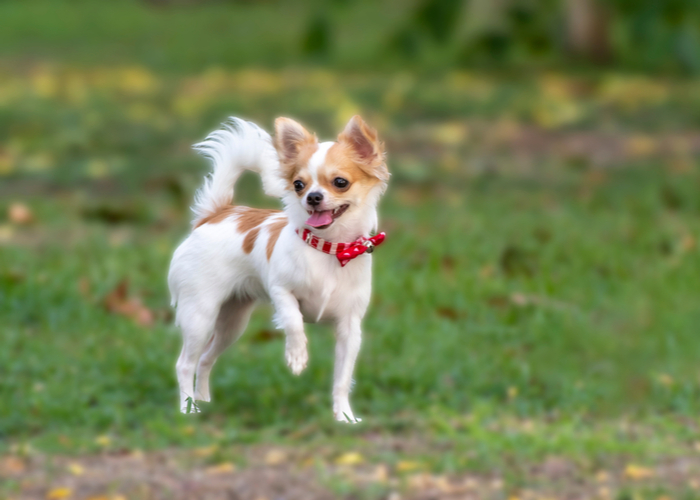
Living Requirements for Chihuahuas
This toy dog breed requires minimal space and is very versatile to any living condition. They are used to warm weather and would enjoy lounging by the pool or in the garden.
Chihuahuas might not do so well in cold temperatures, so it’s best to provide a dog sweater whenever you’re going out or invest in an insulator for their dog beds.
For your Chihuahua’s nutrition, make sure to feed your pooch a quarter to a half cup of quality dry foods daily. Giving treats is essential in training, but best not to overdo it.
This toy dog breed can be prone to overweight if left unmonitored. You might also need to avoid giving table scraps with bones or anything that could block the small esophagus of your pooch.
The Chihuahua is an intelligent breed, making them an easy dog to train. You can sign them up for obedience competitions and dog shows!
Just remember to use positive reinforcement or a reward system during training. Chihuahuas don’t respond well to punishments.
They are easy to house train if you are consistent and start at an early age. Crate training is also helpful for your Chihuahua to control their bladder and prevent them from being destructive when left home alone.
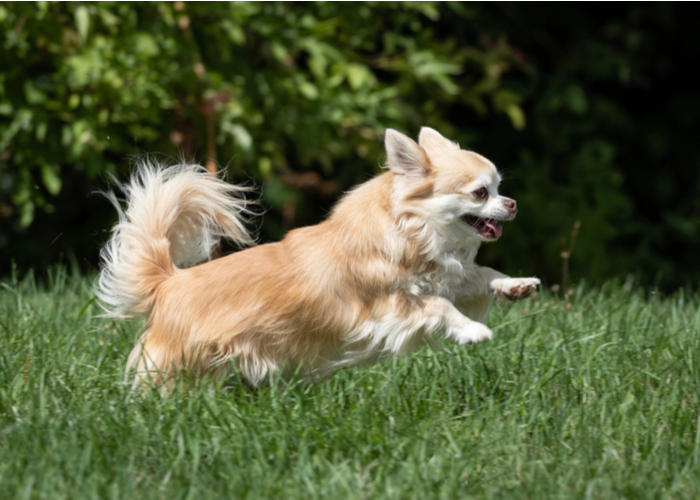
How to Take Care of a Long Haired Chihuahua
Chihuahuas are small dog breeds. They wouldn’t cost much for maintenance, right?
Wrong.
This little puppy, especially the long-haired Chihuahua, requires extensive care and grooming. Some services may even cost more than how much you spend for medium to large dog breeds.
The smooth-coat Chihuahua requires an occasional brushing. You can even use only a damp cloth to clean them up.
As for the long-haired Chihuahua, you need to brush their coat with a pin brush at least twice a week. Have the groomer trim their hair on regular visits.
The best part about having a long-haired Chihuahua, or those with any coat type, is that they look so great with dog clothes and accessories!
However, this might add a little to your budget.
Just like other dogs, you need to brush their teeth regularly and keep their nails trimmed since the nails of Chihuahuas tend to grow quite fast.
Keep a lookout for any tear stains under the eyes of this dog breed. You can use wet tissue or a damp cloth to wipe off the discharge.
Health & Common Ailments of a Chihuahua
The Chihuahua is a healthy dog breed known to have a long lifespan ranging from 14 to 16 years. But just like a few breeds, they can be subjected to genetic problems too!
They are prone to heart diseases, eye ailments, and patellar luxations (loose kneecaps). Idiopathic epilepsy is quite specific for Chihuahuas as well.
You can quickly check for health clearances of your soon-to-be pooch from the Orthopedic Foundation for Animals (OFA) for any patellas and heart disease.
While most breeders have the litter screened before selling them, some illnesses only appear after maturity of about two to three years of age.
ALSO READ: 15 Dog Breeds That Have the Longest Lifespan

Chihuahua versus Teacup Chihuahua
When you talk about small dog breeds, you won’t miss hearing about the teacup Chihuahua. But they are not precisely a ‘new breed’ in the canine kingdom.
“Teacup” was a catchy term coined for Chihuahuas that are smaller than the average size. As the name implies, they are tinier and lighter dogs than usual.
They are so adorable and tiny that sometimes you won’t believe they are living beings! Does this mean it’s okay for anyone to get a teacup Chihuahua?
Compared to the average Chihuahua, the teacup ones may not live as long. They are also prone to health problems.
Teacup Chihuahuas are also very fragile, that you need to handle them with care all the time. The maintenance and grooming require extra attention and expense as well.
If you have a knack for different small breeds, you should prepare yourself for the demands and living conditions.
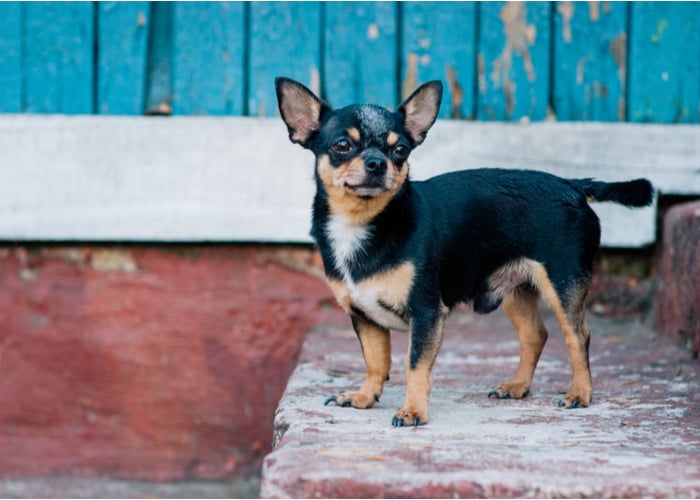
Frequently Asked Questions about Chihuahuas
Here’s what people first ask when they consider getting a Chihuahua:
Is a Chihuahua a good family dog?
Chihuahuas are excellent family dogs. They interact well with older children, other dogs, and small animals like cats.
They love some attention, and they are very active, playful pups. You can also have them as cuddle buddies when you need some downtime.
Is it wrong to get a Chihuahua?
Not at all.
They are a very flexible breed that can adapt to any living condition. The disadvantages of having a Chihuahua are their health issues and fragility.
Because of this, it’s best to get a puppy from a breeder who already had both the pups and parents tested for any health issue.
How much do Chihuahuas cost?
As mentioned, chihuahuas became very popular, so that resulted in its high demand. The average professional breeder would sell their Chihuahua puppies for around $800.
The teacup Chihuahua may cost more since they are specialized puppies. You can have this very tiny pup for $375 – $2,420.
For someone who has a tight budget, you can adopt a Chihuahua from the nearest shelter or rescue group.
Are Chihuahuas cuddly?
Yes, they are! They are affectionate lap dogs that love to cuddle most of the time.
They are great apartment-dwellers who are contented with staying at home. Chihushuas also love to play around and get some exercise, which they can easily do indoors.
Should You Get a Chihuahua
Having a Chihuahua can undoubtedly add some sunshine into your life!
They are the most playful dog breed you can rely on as a loyal and cuddly canine companion. Not to mention, they’d look great with anything you put on them!
Chihuahuas can live longer than other breeds, so you wouldn’t have to worry about having them for a long time (because they will!)
If you plan to get a Chihuahua, you can have the healthiest pup from a reliable breeder in your area. You can also ask nearby vets or experts from the AKC for advice.












